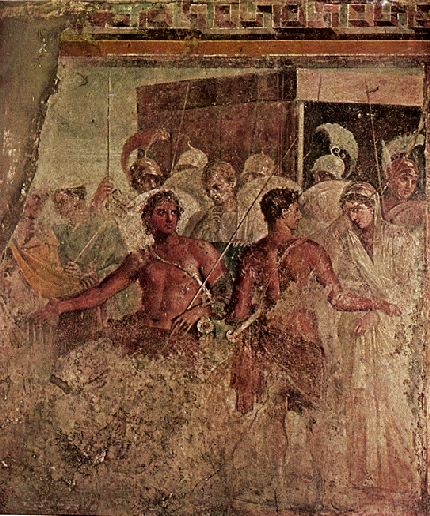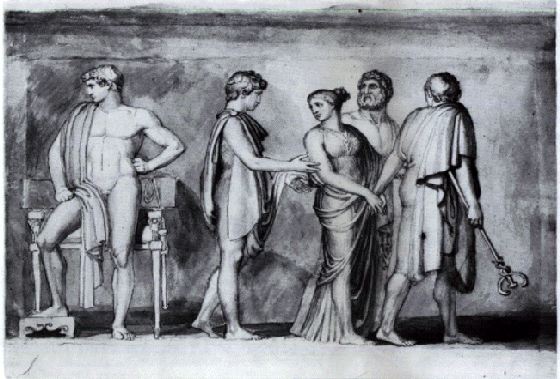|
Ovid, Heroides
3
Briseis to
Achilles
The words you read come from stolen
Briseis,
an alien who has learned some Greek.
A few of these lines are blurred by falling tears,
tears which are as heavy as my words.
If it is right to complain, my lover and
lord, I complain. Not through your fault was
I claimed by Agamemnon but you failed me
by too easily giving me up
when that angry king's harsh demand came to you.
Eurybates and Talthybius came
for me and you obeyed with no reluctance.
Each one glancing at the other's face
wondered in silence if we were still lovers.
You could not refuse, but you might have eased my pain with
only a little delay,
Without a kiss, you let me leave you.
I could not stop my tears, I pulled at my hair,
and I returned to captivity.
I wish I could elude my guards after dark
but someone would catch this timid girl;
a Trojan patrol might find me and give me
to a woman of Priam's family.
Perhaps you did not resist Agamemnon
because resistance could not succeed.
Even so, many nights have passed and still you
have not demanded that I return.
Perhaps I left because you had no choice; still
all these nights I am away and you
have not demanded that I return to you.
Your delay and anger fade slowly.
Menoetius' son whispered 'Why do you weep?
In a little while you will be back.'
Not only have you failed to demand me back,
you now oppose my return to you.
Come now, Achilles, earn the name other have
given you, be an anxious lover.
The sons of Amyntor and Telamon came-
one related by blood, the other
a comrade - with Ulysses [Odysseus], Laertes'
son.
With them I was to return to you.
Begging you to relent, they came to announce
the apology of the great kind.
Many fine gifts magnified their little prayer:
twenty bright vessels of hammered bronze
with seven tripods equal in weight and craft,
ten talents of gold and twelve horses
that were quite accustomed to winning races.
But you did not need his final gift:
many young girls of stunning beauty taken
when Lesbos fell. And in addition,
you were offered a bride, though you have no need:
one of the three daughters of Agamemnon.
All this you might well have paid for my return;
but you refused both the gift and me.
What act of mine has cheapened me in your eyes?
Where is your careless love gone to now?
Perhaps a dismal lot still crushes the sad
and I will not find a sweeter time.
Your brave men levelled the walls of Lyrnessus.
I who was part of my father's land
have seen my dearest relative lying dead:
the sons of my mother, three brothers,
comrades in life, are today comrades in death;
my husband writhed in the bloody dirt,
his body heaving as he lay on the ground.
Though I lost so many dear to me
my loss was eased by loving you as brother,
as my husband, and as my master.
By your mother's divinity, you swore that
I was better a captive than free.
Now I come to you again with a dowry
but you refuse both me and the wealth.
Not only that, they tell me that when dawn breaks
you will unfurl your sails and leave me.
I fainted when I heard the awful story.
To whom will I be left when you go?
Who will comfort me when I am left alone?
May lightning strike or the earth swallow
me before the sea foams with your oars leaving
me farther and farther behind you.
If you must go, I will not burden your ships.
I follow as captive, not as wife.
My fingers know the art of working with wool.
You will take a beautiful bride, one
like Thetis, worthy of Peleus, and so
should you marry; I will be a slave
spinning out my day's work until the distaff
once full of new wool grows thin as threads
are drawn out from it. But only one thing, please:
do not let your bride be harsh with me -
for I fear that she will not be kind to me -
do not let her tear at my hair while
you watch and remember that once I was yours.
I fear nothing so much as the fear
that I will be left here behind when you sail.
Agamemnon's anger has vanished
and Greece is at your feet; at last all has been
subdued by you except your anger.
Why does Hector harass the Greek lines? Take up
your bright armour- but take me back first-
and the god, Mars, will help you to victory.
I caused your wrath, I can easily end it.
It would not be shameful to yield my prayer:
Meleager's wife roused him to fight.
The tale is one I have heard, you know it well:
A mother cursed her son for killing
her brothers, but then war came and he refused
to fight in defence of his country.
Only his wife could change his mind. I envy
her : I have wasted my words on you,
yet I am not angry. Though called to your bed,
I have not presumed to be your wife.
Some woman once called me 'mistress'. I replied
'That name adds to the shame of slavery.'
I swear this oath. By the bones of my husband
which, though scarcely buried, are sacred;
by the souls of my three brothers, now my gods,
who bravely died when their country died;
by your head and mine which we laid side by side
and by your sword which my family knew:
I swear that the Mycenaean king has shared
no couch with me. If I lie, leave me.
If I asked you to swear a similar oath-
'Bravest one, swear that you have tasted
no joys except the joy you have known with me'-
you would refuse. The Greeks think you mourn,
but you are making music and a gentle
maiden holds you in her warm embrace.
Why won't you fight? Because to fight is a risk
while a lyre and Venus at night bring
delight. It is safer to lie on your couch
holding some girl close to you, plucking
at the Thracian lyre, rather than taking
into your hands the massive shield and
the sharpened spear, and putting upon your hair
the weight of a helmet made for war.
Once great deeds rather than safety pleased you most
and the glory of battle was sweet.
Was this merely a trick to win me captive
when you won the glory of my land?
By the gods, it cannot be. May the great spear
from Pelion fly to Hector's side.
Send me, O Greeks: let me present your message
to my lord. I will achieve more than
Phoenix, more than Ulysses, more than Ajax;
I will mingle your words with kisses.
You will remember when my arms touch your neck;
the sight of my breasts will stir your heart.
Though cruel and more savage than your mother's waves,
my tears and my silence will crush you.
Be decent toward me, brave Achilles, do not
torture poor Briseis with delay.
With me in your tent you can take up arms and
make your father in his old age proud.
Take me back, return to the battlefield and
one day Pyrrhus will wish for your luck.
But if love has turned to weariness, kill me
rather than make me live without you.
But your deeds have already done this to me:
my skin is old, my colour is gone;
my trust in you is the one hope I retain.
When that goes, I will join my family,
my brothers and husband, and I will leave you
with the shame that you left me to die.
Why should I wait for you to tell me to die?
Draw your sword, plunge it into my flesh,
I have blood that will pour out of my pierced breast,
let me be struck down by the weapon
which should have killed the son of Atreus if
the goddess had not prevented it.
But save my life, it is the gift you gave me.
What I received when you conquered me
give me again, I ask you now, in friendship.
Troy has many for to you to slaughter,
your sword is ready, its victims are waiting:
destroy them, they are your enemy.
But I beg you, whether you decide to remain
or leave, be my lord, command that I go to you.
Translated by Harold Isbell
(Penguin books, 1990)
|

|


